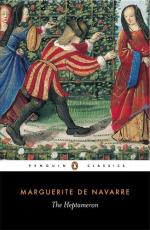Amadour was well pleased to find that Florida loved something, hoping that in time he might gain the place not of husband but of lover. He had no fear in regard to her virtue, but was rather afraid lest she should be insensible to love. After this conversation he began to consort with the son of the Infante of Fortune, and readily gained his favour, being well skilled in all the pastimes that the young Prince was fond of, especially in the handling of horses, in the practice of all kinds of weapons, and indeed in every diversion and pastime befitting a young man.
However, war broke out again in Languedoc, and it was necessary that Amadour should return thither with the Governor. This he did, but not without great regret, since he could in no wise contrive to return to where he might see Florida. Accordingly, when he was setting forth, he spoke to a brother of his, who was majordomo to the Queen of Spain, and told him of the good match he had found in the Countess of Aranda’s house, in the person of Avanturada; entreating him, in his absence, to do all that he could to bring about the marriage, by employing his credit with the King, the Queen, and all his friends. The majordomo, who was attached to his brother, not only by reason of their kinship, but on account of Amadour’s excellent qualities, promised to do his best. This he did in such wise that the avaricious old father forgot his own nature to ponder over the qualities of Amadour, as pictured to him by the Countess of Aranda, and especially by the fair Florida, as well as by the young Count of Aranda, who was now beginning to grow up, and to esteem people of merit. When the marriage had been agreed upon by the kinsfolk, the Queen’s majordomo sent for his brother, there being at that time a truce between the two kings. (7)
Meanwhile, the King of Spain withdrew to Madrid to avoid the bad air which prevailed in divers places, and, by the advice of his Council, as well as at the request of the Countess of Aranda, he consented to the marriage of the young Count with the heiress Duchess of Medina Celi. (8) He did this no less for their contentment and the union of the two houses than for the affection he bore the Countess of Aranda; and he caused the marriage to be celebrated at the castle of Madrid. (9)
7 There had been a
truce in 1497, but Queen Margaret
probably alludes to
that of four months’ duration towards
the close of 1503.—B.J.




